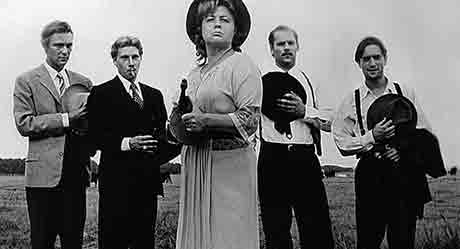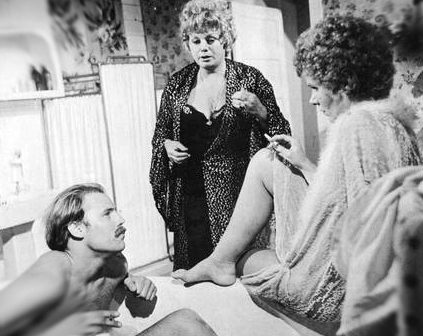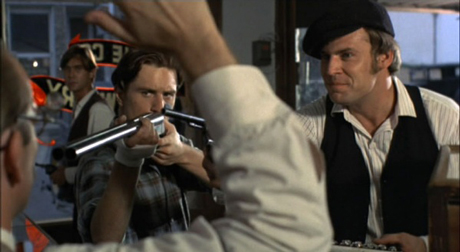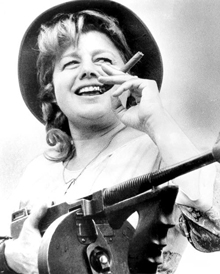Reviewed by Glenn Erickson
We often read that producer-director Roger Corman ended his association with American-International because Sam Arkoff and Jim Nicholson began editing his movies behind his back. The cutting of Gas! has been cited as the last straw, although there was no way to make that post-apocalyptic poor man's 8½ any worse than it was. Corman had already tried working with the big studios and couldn't deal with the loss of control over nearly every aspect of the process. He decided instead to stop directing and become a producer-distributor. He found the money too good to resist.
Corman's penultimate directing job for Arkoff and Nicholson ws Bloody Mama a fictionalized look at the notorious Barker Gang. As with many Corman projects it followed an existing trend, in this case, the Depression-era rural gangster tale. MGM released The Moonshine War around the same time. Perhaps influenced by Easy Rider, Corman filmed on location and allowed space for his carefully chosen actors to 'do it their way'.

Bloody Mama is a smartly-conceived vehicle. Former starlet Shelley Winters' last major glamour role was in 1966's Alfie. She'd actually played the infamous Ma Barker in an episode of TV's Batman, so Roger Corman could see that she was a natural for the bloozy, profane white trash bandit who slept with her own grown boys. The spectacle of Winters as the bigger-than-life Barker carried a curiosity factor comparable to Bette Davis's horror-hag in Robert Aldrich's What Ever Happened to Baby Jane? Finally, Corman rolled the dice and hired a pack of young talent, some of them unproven. Diane Varsi and to a lesser extent Don Stroud already had substantial industry experience, and while Bruce Dern was a known personality who had been doing great work but getting nowhere for ten years. Clint Kimbrough, Robert De Niro, Robert Walden and Pamela Dunlap could be classified as best-guess long shots. One of Corman's few bad filmmaking decisions had been to pass on Easy Rider, even though it was an obvious outgrowth next step from his own biker and acid-trip movies. This time he'd invest in the youth appeal market.
The story starts in hillbilly country. Bankrupt Kate Barker (Shelley Winters) abandons her slow-witted husband George (Alex Nicol) and takes off on a rampage of banditry with her four wild and lawless sons. Her philosophy: "This is supposed to be a free country, but unless you rich, you ain't free." None of the Barker boys can be called normal. Herman (Don Stroud) is the strongest but has an unreasonable temper. He brings along his prostitute girl friend Mona Gibson (Diane Varsi). Lloyd (Robert De Niro) is constantly high, first on airplane glue and then hard drugs. Just as undependable as Lloyd is Fred (Robert Walden), a masochist who discovers that he's homosexual while doing a prison stint. Fred's cellmate Kevin Dirkman (Bruce Dern) joins the Barker Gang when they're both set free. Arthur (Clint Kimbrough) is the most reasonable but also the least aggressive of the bunch; he also is his mother's most frequent sex partner. This group of incompetents remains at large for a while only because Ma enforces a ruthless 'no witnesses' policy, which unfortunately requires that they murder 'Rembrandt' (Pamela Dunlap), a casual acquaintance of lonely Lloyd. Ma eventually organizes the kidnapping of the wealthy Sam Adams Pendlebury (Pat Hingle), which backfires when the captive proves to be both courageous and morally influential. Stroud sees Pendlebury as a father substitute, which undermines Ma's authority.

The Barker clan subscribes to the 'trickle-down depravity principle' -- Thom's script and the uninhibited acting knock the notion of 'family' on its ear. The boys cede all authority to their Ma, who comes off as a horrifying real-life exaggeration, a deranged matriarchal figure. She's over-protective of her boys and yet sends them out to rob and kill. Kate foolishly believes that her brood can be managed in a state of infantile obedience. By sleeping with her boys, she somehow thinks she will also keep them away from the influence of other women. When Pat Hingle's strong father figure comes into the picture we immediately anticipate a rupture in Ma Barker's authority. The murdering family prevails (for a time) only because her boys don't have to face their own degeneracy.
Starting with Shelley Winters, the cast is stacked with actors that take their craft seriously. As a unit they have no problem expressing the dangerously disengaged attitudes of these warped sociopaths. The brothers are like wild dogs, each with his own psychological problems. The actors' commitment almost transcends the film's more exploitative content. Former teen star Diane Varsi plays a cagey hooker-survivor and is established nude and rude in her very first shot. Later on we're more interested in how she fits into the family dynamic -- how she reacts to the killings, how she decides when it's time to leave.
The film makes good on its genre promises. In addition to the Barkers' sleazy sex relationships Bloody Mama has the requisite action and violence. The car chases aren't particularly extreme but the shootings and other murders are fairly grisly, and not shown in a glamorous light. Herman and Fred are caught in a lame attempt to steal a donation box at a country picnic. One murder involves the cowardly drowning of a helpless girl. The brothers ignore Lloyd's addictions until he drugs himself into oblivion. Director Corman saves his biggest shootout for the conclusion. It delivers the expected gory slaughter in a hail of gunfire.

Roger Corman was no stranger to filmic experimentation, within the bounds of a commercial product. His Sci-fi movie X- The Man With the X-Ray Eyes tried to splinter time and space to show the dislocation of its hero, as did his later The Trip. Here Corman seems to be trying to relax his tight control over the shape of the film; his direction seems looser and less economy-driven. Writer Robert Thom's script allows room for the actors shape the film around their performances; Corman used a rehearsal period to get everyone working naturally together. It shows in the finished film's free-flowing quality. The actors don't simply recite dialogue at each other. Only a few uninspired montages of B&W stock shots to add 'historical context' remind us of conventional filmmaking. Bloody Mama plays like a fresh direction for Corman.
A.I.P. wanted the film shot locally but Corman wisely realized that the Bonnie and Clyde vibe couldn't be achieved filming in Hollywood. He had learned plenty of guerilla filmmaking tricks for shooting on the fly on location, many learned on his stealth civil rights movie, The Intruder. The authentic Missouri & Arkansas locations are a big plus. We can be sure that the 'Corman Gang' was in and out of locations before the local authorities knew they were there.

Critic J. Hoberman remembered that the movie briefly made news when A.I.P. tried out a tag line, "The Family that Slays Together, Stays Together!" on a billboard on the Sunset Strip. It appeared just as the revelation of Charles Manson and his killer cult 'family' became public, and the locals protested. Although few critics applauded, the picture benefited from the curiosity value of seeing Shelley Winters make a spectacle of herself. Did the film do anything for its ambitious cast? Robert Walden's career arc took a modest upturn but Robert De Niro's portrayal of the always-zonked Lloyd attracted little attention. Robert Stroud was already doing well and stayed on course. Bruce Dern continued to limp along until his performances in Silent Running and especially The Cowboys greatly enhanced his audience familiarity quotient.
A.I.P. followed up Bloody Mama with Martin Scorsese's weak Boxcar Bertha and writer-director John Milius' more elaborate Dillinger, a hit weighed down only by overlong shootout scenes. For his distribution company New World, Roger Corman returned to the Depression-era gangster setting to produce the jokey exploitation pictures Big Bad Mama and Big Bad Mama II.
The Scorpion Releasing Blu-ray of Bloody Mama is a major revival for Corman's sordid gangster tale. Until now I had only seen terrible -- really terrible -- 16mm prints in revival screenings and on TV. This attractive HD transfer restores bright colors to the picture, and the sharper picture gives us a better look at the acting in ensemble scenes. Bloody Mama may be the first feature credit for the fine cinematographer John Alonzo, whose extensive docu experience may have contributed to the heightened naturalism  in Corman's direction. Alonzo has the lighting instincts of a European DP. The light always seems natural and he gets a great look from a minimum of resources. In just four years he would be credited for the impressive camerawork on Roman Polanski's Chinatown.
in Corman's direction. Alonzo has the lighting instincts of a European DP. The light always seems natural and he gets a great look from a minimum of resources. In just four years he would be credited for the impressive camerawork on Roman Polanski's Chinatown.
Corman appears for a good interview piece, describing the filming and praising his collaborators in more enthusiastic terms than usual. He seems very proud of the picture and his many associates that went on to bigger and better things. A trailer is included as well.
On a scale of Excellent, Good, Fair, and Poor,
Bloody Mama Blu-ray rates:
Movie: Good +
Video: Excellent
Sound: Excellent
Supplements: Interview featurette with Roger Corman, trailer
Deaf and Hearing Impaired Friendly?
N0; Subtitles: None
Packaging: Keep case
Reviewed: October 3, 2014

Text © Copyright 2014 Glenn Erickson
See more exclusive reviews on the Savant Main Page.
Reviews on the Savant main site have additional credits information and are often updated and annotated with reader input and graphics.
T'was Ever Thus.
Return to Top of Page
|

